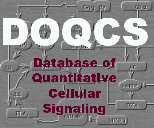
|
Enter a Search String | | Special character and space not allowed in the query term.
Search string should be at least 2 characters long. |
Molecule List for pathway Sos (Pathway Number 337) in Accession Ajay_Bhalla_2004_PKM_MKP3_Tuning (Accession Number 77) | Default ordering is done according to Pathway Number. Table headers can be used for changing the default ordering.
  arrow indicates that ordering is done according to ascending or descending order. arrow indicates that ordering is done according to ascending or descending order.
The entries are grouped according to Pathway Number and are alternately color coded using  and and  color. color. |
| |
Name | Accession
Type | Initial
Conc.
(uM) | Volume
(fL) | Buffered | Sum Total Of | | 1 | Sos.Grb2 | Network | 0 | 0 | No | - | | 2 | Sos*.Grb2 | Network | 0 | 0 | No | - | | 3 | Sos* | Network | 0 | 0 | No | - | | 4 | Sos | Network | 0.1 | 0 | No | - | | | I have tried using low (0.02 uM) initial concs, but these give a very flat response to EGF stim although the overall activation of Ras is not too bad. I am reverting to 0.1 because we expect a sharp initial response, followed by a decline. Sep 17 1997: The transient activation curve looks better with [Sos] = 0.05. Apr 26 1998: Some error there, it is better where it was at 0.1 | | 5 | Grb2 | Network | 1 | 0 | No | - | | | There is probably a lot of it in the cell: it is also known as Ash (abundant src homology protein I think). Also Waters et al JBC 271:30 18224 1996 say that only a small fraction of cellular Grb is precipitated out when SoS is precipitated. As most of the Sos seems to be associated with Grb2, it would seem like there is a lot of the latter. Say 1 uM. I haven't been able to find a decent.... |
| Database compilation and code copyright (C) 2022, Upinder S. Bhalla and NCBS/TIFR
This Copyright is applied to ensure that the contents of this database remain freely available. Please see FAQ for details. |
|
